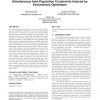2958 search results - page 549 / 592 » Optimal Transportation Problem by Stochastic Optimal Control |
GECCO
2009
Springer
14 years 2 months ago
2009
Springer
The need for a stopping criterion in MOEA’s is a repeatedly mentioned matter in the domain of MOOP’s, even though it is usually left aside as secondary, while stopping criteri...
GECCO
2006
Springer
13 years 11 months ago
2006
Springer
The use of genotypic populations is necessary for adaptation in Evolutionary Algorithms. We use a technique called form-invariant commutation to study the immediate effect of evol...
GECCO
2010
Springer
13 years 11 months ago
2010
Springer
Understanding the evolution of cooperation as part of an evolutionary stable strategy (ESS) is a difficult problem that has been the focus of much work. The associated costs of co...
GECCO
2008
Springer
13 years 9 months ago
2008
Springer
A major difficulty for anomaly detection lies in discovering boundaries between normal and anomalous behavior, due to the deficiency of abnormal samples in the training phase. In...
GECCO
2010
Springer
13 years 8 months ago
2010
Springer
This paper takes an economic approach to derive an evolutionary learning model based entirely on the endogenous employment of genetic operators in the service of self-interested a...

